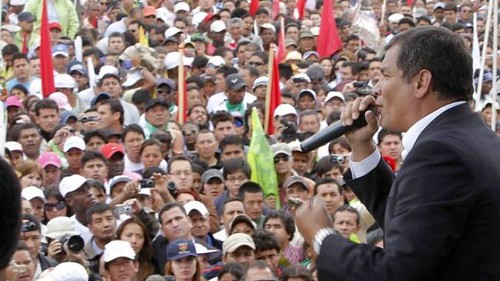
Ecuadorean President Rafael Correa speaking to the masses in this South American state. Correa said that he would not attend the Summit of the Americas due to the exclusion of Cuba., a photo by Pan-African News Wire File Photos on Flickr.
Julian Assange can stay in embassy for 'centuries', says Ecuador
Britain should withdraw 'threat' to storm building in Knightsbridge, say Ecuadorean officials
Luke Harding
guardian.co.uk, Thursday 23 August 2012 13.27 EDT
Ecuadorean officials have said that Britain should renounce its "threat" to storm the country's London embassy, and that WikiLeaks founder Julian Assange could remain inside the building for as long as he wanted – "two centuries" if necessary.
The officials said there had been no contact with the Foreign Office since last Thursday, when Ecuador's president Rafael Correa announced he was granting Assange asylum. Ecuador was keen to resume negotiations with the UK, the officials said, but added that William Hague should now take back a threat to enter the embassy as "an indication of good faith".
Ecuadorean diplomatic sources also insisted there had been no secret deal to grant Assange asylum. They said Assange simply turned up at the front door two months ago at midday and rang the bell. The Ecuadorean ambassador, Ana Alban, was forced to dash home to fetch a blow-up mattress for Assange to sleep on. Since he took up residence, the embassy had got a bigger fridge, the sources said.
The UK last week gave a written warning to Quito saying that it could invoke the Diplomatic and Consular Premises Act 1987 to arrest Assange inside the Knightsbridge embassy. This prompted a furious response from Quito. Hague later clarified that the FCO was not threatening to "storm an embassy". On Thursday, however, an Ecuadorean diplomatic source said: "The threat hasn't been withdrawn." The source suggested that the police presence around the building was excessive, with the embassy under siege at one point last week and still surrounded by dozens of policemen now. "It was amazing. There used to be four or six policemen since Mr Assange got here. Suddenly there were three trucks of police surrounding us. There were police on the interior stairs. There was even one in the window of the toilet. It was clearly a message."
Ecuadorean officials said they still believed a compromise over the Assange case was possible. They said Sweden and the UK should give political assurances that the WikiLeaks founder, who faces allegations of sexual misconduct in Sweden, would not be re-extradited from there to the US. Failing that, they said Britain should grant him safe passage so he could fly to Ecuador.
There seems little prospect that the UK will agree to this. The Foreign Office says it is legally obliged to extradite Assange to Sweden. Both sides now appear to be settling in for the long haul.
Asked how long Assange might remain at the embassy, an Ecuadorean official said: "However long it takes. Eight years. Two centuries." The official said it was ridiculous to suggest diplomats would try to smuggle him out.
On Thursday the FCO said in a statement: "We have made clear we are committed to a diplomatic solution.
"We will be sending a formal communication today to the Ecuadorean embassy. We will not go into the detail of private discussions."
On Wednesday the news agency Reuters, citing US government sources, said Washington had issued no criminal charges against Assange. His supporters claim the US is plotting to extradite and to execute him. Obama administration officials remain divided over the wisdom of prosecuting Assange, Reuters said, and the likelihood of US criminal charges against him is probably receding rather than growing.
On Friday foreign ministers from across Latin America will meet in Washington to discuss the Assange case. A draft resolution from the Organisation of American States calls on the UK to comply with the 1961 Vienna Convention on Diplomatic Relations and to respect the "inviolability" of the Ecuadorean embassy. The Foreign Office has been lobbying South American states to abstain. On Thursday, however, one Ecuadorean official predicted the FCO's efforts were doomed, adding: "Most Latin American countries are working as one [on this]."
On Sunday Assange made his first public appearance since walking into the embassy in June, addressing crowds of journalists and supporters from a first-floor balcony window, with Metropolitan police officers a few feet below him on the pavement. He called on President Obama to abandon his alleged "witch-hunt" against WikiLeaks. Assange also thanked several other Latin American countries for their support – implicitly warning Britain that any dispute with Ecuador could rapidly snowball into a conflict with the entire region. He said nothing about allegations by two Swedish women that he sexually assaulted them.
TodayOn Thursday Ecuadorean officials denied that it had been a provocative move to allow Assange to use embassy property to berate the United States. "It was the balcony or a window," one said. "He had to deliver a message. A lot of people were wanting to know what he looked like. They wanted an image. It had political value."
The officials also shrugged off criticism of Ecuador's record on press freedom, which has come under increasing scrutiny since Assange sought asylum. "Walk around the streets of Quito, hear the radio and watch TV, and see what some journalists say about the government. There is a lot of freedom," one source said.
Scotland Yard has declined to comment on the policing operation at the embassy, while the FCO has said the letter sent to Ecuadorean authorities on Wednesday of last week was not menacing and that the rights of the country's officials would continue to be respected by the government.
No comments:
Post a Comment